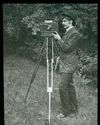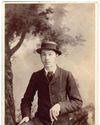
Julia Margaret Cameron (1815-79) is rightly considered a pioneer of photography. Born in India, she established her photographic practice while living on the Isle of Wight, inspired by the gift of a camera from her daughter in 1863. Her photographs broke conventions in the period and portray her strong artistic vision and determination. The Victoria and Albert Museum (V&A) holds the largest collection of works by Cameron in the world. Here, Catlin Langford speaks to Senior Curator of Photography Marta Weiss and Curator of Photography Touring Exhibitions Lisa Springer, authors of the recently published Julia Margaret Cameron: Arresting Beauty.
Catlin Langford (CL): You previously collaborated with MACK on a Julia Margaret Cameron publication which also aligned with a 2015 exhibition. So why this publication, and why now?
Marta Weiss (MW): The 2015 publication was in celebration of Cameron’s bicentenary and accompanied the touring exhibition to Moscow, Ghent, Madrid, Tokyo and Sydney. The exhibition and publication were based entirely on the V&A’s collection, then comprising around 280 prints, and was organised around letters by Cameron to Henry Cole, the founding director of the V&A. The V&A has a very special relationship with Cameron: it was the first museum in the world to collect her photographs in any depth. We acquired over 100 photographs directly from her in 1865. In 1868, Cameron used a space in the museum as a studio. The MACK book focused on this aspect of her practice.
In 2017, the Royal Photographic Society (RPS) collection was transferred to the V&A and featured around 600 further prints by Cameron. Today the V&A holds just under 1,000 works by Cameron, by far the largest collection in the world.
This story is from the April 18, 2023 edition of Amateur Photographer.
Start your 7-day Magzter GOLD free trial to access thousands of curated premium stories, and 9,000+ magazines and newspapers.
Already a subscriber ? Sign In
This story is from the April 18, 2023 edition of Amateur Photographer.
Start your 7-day Magzter GOLD free trial to access thousands of curated premium stories, and 9,000+ magazines and newspapers.
Already a subscriber? Sign In

Calling The Shots: A Queer History of Photography
Offering an unprecedented view of photographic history through a queer lens, this is a wonderful and powerful book, says

Large-aperture standard zoom, too
SONY has also revealed a new premium standard zoom, the FE 28-70mm F2 GM.

Super-fast, high-res Sony Alpha Ai II
SONY has announced its new professional full-frame flagship camera, the Alpha A1 II.

39 awesome accessories
Our round-up of the best accessories we've used and reviewed this year, along with some old favourites. There's something here for every budget, starting from just £7, including tripods, bags, filters and much more

Such a thing as society
This autumn sees the launch of a major new book and exhibition devoted to examining the multiplicities of photography during 1980s Britain. Peter Dench finds out more

Join Club
The sociable Canvey Island Photographic Club is keen to grow its in-person meet ups

Capturing flight
Winners and finalists of Bird Photographer of the Year share their tips for success with Hollie Latham Hucker

140 years of change
AP has become the world’s oldest surviving consumer photo magazine because we have moved with the times, says Nigel Atherton

Preserving history in platinum
A deep dive into the meticulous art of platinum printing, and the collaboration between the Royal Geographical Society and Salto Ulbeek. Mike Crawford explores how they brought historical photographs to life with enduring beauty and precision

Life in the past lane
What was life like for an amateur photographer in 1884? John Wade takes a trip back in time